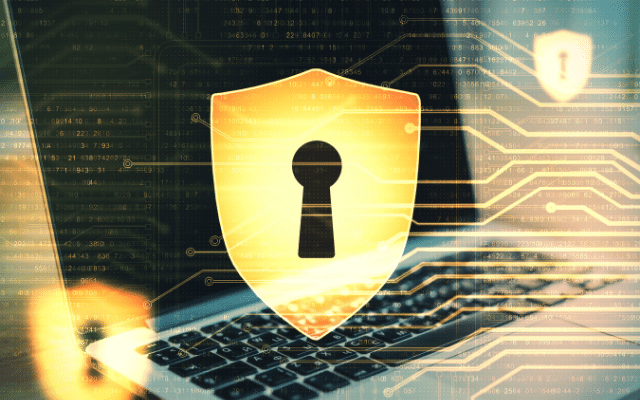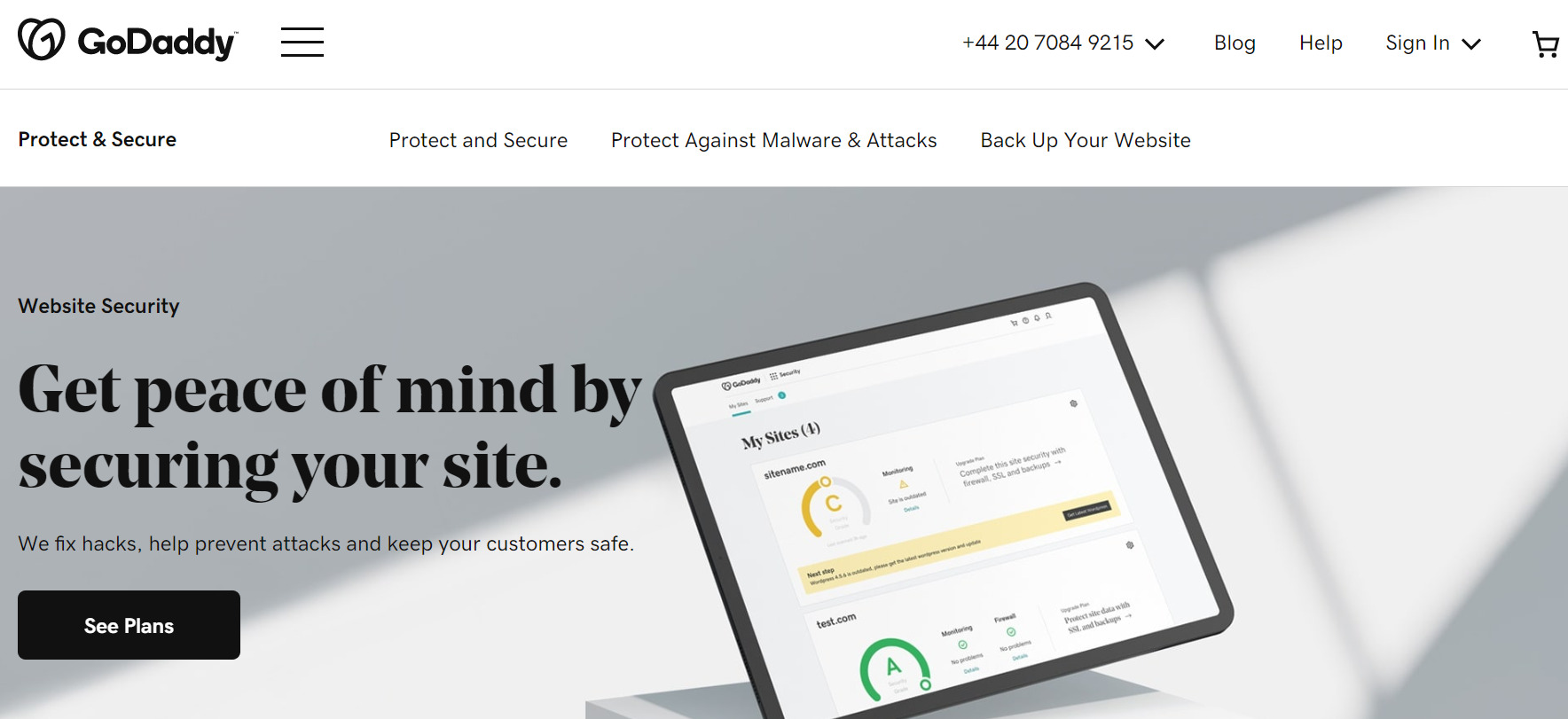Don’t be an easy target. For something that can destroy a business within minutes, increasing cybersecurity is often an afterthought especially for small businesses. That is, until it's too late.
But how bad could it be? Here are some quick stats for you…
According to the survey conducted by GoDaddy in the MENA region in 2021, 55% of businesses in the region have experienced some sort of a security breach. With our personal and professional lives increasingly taking place online, criminals are finding more opportunities to exploit our personal data. The pandemic has also resulted in a huge shift in consumer behavior, with more people shopping online.
The survey also showed:
- 84% of MENA respondents felt that the issue of cyber security is important to small businesses.
- 73% agreed that small businesses are at risk of cyberattacks.
- 74% of MENA respondents believed that malware was the larger threat, followed by phishing at 68%.
- 30% of participants in the MENA region said that they would know how to deal with a cyberattack themselves.
- Less than 40% said they would at least know where to go for help.
- 32% reported that they would be unsure of how to deal with a cyberattack.
The impact?
- Caused website downtime (46%)
- Financial loss (32%)
- Affected the company's reputation negatively (19%)
To help put things into perspective: 74% of MENA respondents believed that malware was the larger threat, followed by phishing at 68.
These cyberattacks, phishing, and malware were perceived as the biggest potential security threats to small and medium-sized businesses SMBs
In short, small business cybersecurity is now more important than ever.
Why are small businesses prone to cyberattacks?
They’re easy prey.
Small businesses often lack cybersecurity resources to invest in robust cybersecurity measures. They are also less likely to have dedicated IT staff who can quickly identify and respond to an attack.
These days, it seems like you can't go a week without hearing about some new cybersecurity threat.
Whether it's phishing attacks, malware, hacking, or data breaches, businesses need to be more vigilant than ever before. But with so many different threats to keep track of, where do you even start?
Related: 5 cybersecurity tips for your small business
Cybersecurity for small business websites: Common threats
Malware
Malware is designed to damage or disable computers, servers, and networks. Many hackers use malware to steal sensitive data, delete important files, or take control of a computer. Malware can be spread through email attachments, infected websites, or even USB drives. The many different types of malware have one thing in common: they are all incredibly destructive.
Ransomware
There’s nothing like the panic of seeing a message pop up on your computer screen telling you that all your files have been encrypted and you have to pay a ransom to get them back. Welcome to the world of ransomware and cybercrimes, where hackers make your life a living nightmare.
Ransomware attacks have surged in recent years. Gangs of cybercriminals are targeting businesses, schools, municipal governments, nonprofit groups, and even hospitals. Attackers typically use sophisticated encryption software to lock up a victim’s computer networks, then demand a ransom to unlock them. In many cases, hackers also steal sensitive data from victims and threaten to release it publicly unless they are paid off.
Acer paid one of the biggest ransomware reported in the history back in March 2021. A whopping $50 Million.
Phishing
In 2016, the central bank of Bangladesh was hit by a massive cyberattack, one of the biggest in history. The year before, the hackers gained access to the bank's system by sending out phishing emails posing as job seekers, with attachments containing malware. After infecting the bank’s system, the hackers posed as genuine bank employees and nearly pulled off a billion-dollar heist.
This is phishing a.k.a. cyber scams. It's a type of attack in which cybercriminals send emails or text messages that appear to be from a legitimate source. The goal is to trick victims into disclosing sensitive information like login credentials and credit card numbers or clicking on malicious links.
Spyware
Spyware is a fancy way of saying "surveillance software". It's a type of malware installed on a victim's computer without their knowledge in order to collect sensitive information like login credentials and credit card numbers or track their web browsing activity.
Social engineering

Meet Eric, a victim of a Social Engineering cyberattack. It all started when an impersonator was able to trick an Amazon customer support representative into revealing Eric's real address and phone number. Armed with this information, the impersonator posed as Eric and managed to issue a new credit card in his name.
Social Engineering can be described as "manipulation". It's a type of attack in which criminals use psychological tricks and exploit the “faults” in our human emotions and feelings to get victims to disclose sensitive information or click malicious links.
Distributed denial of service (DDoS) attacks
When your website starts loading a little slowly, it's easy to dismiss it as a minor issue. After all, there could be many reasons for the slowdown – from server issues to a high volume of traffic.
But a slow website can be the first sign of a more serious problem: a DDoS attack.
DDoS attacks take websites offline by overwhelming them with traffic. This can result in lost revenue, breached data, and reputational damage for your business.
You might think that your small business website is too insignificant to be a target for a DDoS attack. But the truth is, even small businesses are at risk. In fact, many small businesses are part of a bigger supply chain, making them an attractive target for attackers looking to cause havoc.
Editor’s note: GoDaddy’s Website Security not only has firewall protection against DDoS attacks, it also boosts your site’s load time by up to 50% - complete security, less headaches!
Related: Distributed Denial of Service: What are DDoS attacks and what can you do to prevent them?
Cybersecurity for small business: How can you improve?
Increase cybersecurity for small business by educating your employees
As a small business owner, you know that your employees are your greatest asset. But did you know that they can also be your biggest liability when it comes to cybersecurity?
Data breaches can often be traced back to human error. Therefore, cybersecurity should begin with training the people in your organization on how to handle sensitive information safely. Whether it is securing laptops and mobile devices, or updating software operating systems, these everyday actions will make a difference in combating cybersecurity threats for small businesses.
When your employees are informed about the latest threats and security policies, they can take steps to protect themselves and your business. In addition, educating your employees will help them to identify suspicious activity or security breaches and report it to you immediately.
Related: Top website security threats and how to protect your site from attack
Use the most updated antivirus software

Have you ever opened an email that seemed pretty harmless? Perhaps a friend has sent you something with an attachment?
Sometimes an email from “your friend” can actually be some hacker who has managed to sneak a virus into the message.
As scary as that may sound, who’s got the time to worry about whether every seemingly harmless email is malicious?
Here’s where the latest antivirus software updates are crucial, helping to defend against most types of malware. Antivirus solutions are constantly evolving to keep pace with the latest threats, and they can provide a critical line of defence against viruses.
Of course, no security measure is 100% effective, so it's also important to have an integrated approach to cybersecurity.
Enable Multi-Factor Authentication
MFA or two-factor authentication is a way to add an extra layer of security to your online accounts. When you enable MFA, you are required to provide not only your username and password, but also a code generated by an app on your phone or sent to your email account. By requiring multiple pieces of information, MFA makes it much harder for hackers to gain access to your account, even if they have your username and password.
MFA can also help to prevent phishing attacks, as criminals will no longer be able to rely on stolen passwords to gain access to your accounts. Enabling MFA for your business is definitely something you need to be doing to boost your cybersecurity.
Use strong passwords
If your passwords are weak, it's only a matter of time before someone hacks into your account and wreaks havoc on your business.
So what makes a strong password? For starters, it should be at least 8 characters long. It should also include a mix of upper and lowercase letters, numbers, and symbols. Avoid using easily guessed words like "password" or your name, and don't reuse passwords across different accounts. And most importantly, it should be something that you can remember easily but that would be difficult for someone else to guess.
Ditch the "password" and go for something a little more creative. Your business will thank you for it.
Increase cybersecurity for small business with an SSL certificate

An SSL certificate is like a virtual padlock that encrypts information exchanged between your website and your visitors' web browsers. This helps to protect sensitive data like credit card numbers and passwords from being intercepted by malicious third parties.
As an added benefit, having an SSL certificate can help to increase your search engine ranking and boost customer confidence in your business.
For one thing, Google now gives preference in its search results to SSL-protected websites. Hence if you're not using SSL, potential customers might never even see your site. In addition, many web browsers now display warning messages when users try to access non-SSL sites. That can scare away potential customers before they've even had a chance to check out your products or services.
Related: 10 eCommerce website security steps to protect against cyber threats
Backup your data
As anyone who has ever lost their phone can attest, backing up data is essential. Besides protecting you from the inconvenience of having to start from scratch, it also helps to guard against more serious problems like losing important work documents or irreplaceable photos. For any business in today’s digital world, losing data such as customer information, sales records, employee files, and financial records could put them in a real pickle.
Fortunately there are plenty of options when it comes to backing up your data, from an external hard drive to cloud storage. Whichever method you choose, make sure that you're doing it regularly. Set up daily automatic backups so your data is protected without you having to think about it.
Cybersecurity for small business: start enhancing yours.
Cybersecurity for small business should not be overlooked in an era where vulnerabilities are easily exploited by cyber attackers. Securing your small business from cybersecurity threats doesn’t have to be expensive or time-consuming. Follow these simple steps to protect your company without needing to hire an expensive tech professional.
Sign up for GoDaddy's Website Security plans for the ultimate protection. This comprehensive solution will help keep your business safe from online threats 24/7, so that you can focus on making more money without worrying about falling prey to a hacking scheme.
Start looking into a cybersecurity plan for your small business today!






